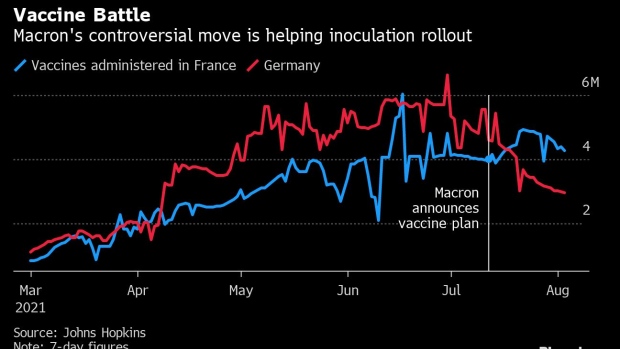Aug 6, 2021
Macron’s Rebound from Vaccine Waterloo Gives Him Political Clout
, Bloomberg News

(Bloomberg) -- Late in March, Emmanuel Macron faced a harsh reality. Virus infections in France were persistently high and the vaccination campaign so anemic that his right-wing nemesis, Marine Le Pen, called it Macron’s “Waterloo.” The president had no choice but to enforce another nationwide lockdown.
Fast-forward four months, and France has rebounded, inoculating large swaths of its adult population and keeping new infections comparatively low. Bars and restaurants have re-opened, cross-border travel has become more fluid, and Macron just overcame a legal hurdle that lets him packs more punch in his fight against the coronavirus.
On Thursday, France’s constitutional court sanctioned Macron’s push for a vaccine passport. Under the government plan, the electronic document stores the holder’s immunization or testing status and provides access to restaurants or cinemas. The legislation is now set to enter into force on Aug. 9, as planned.
Conversely, those who refuse to get the jab could end up being de facto barred from these cherished French institutions. That, in return, has prompted a massive drive from previous holdouts to get the shot. France administered about 4.9 million doses in past week, compared with 2.9 million for Germany.
“The decision strengthens the executive power in its plan to enforce the health pass,” said Bernard Sananes, a political analyst and president of polling company Elabe, said of the court ruling. “The government’s challenge is how to implement the measures while keeping social tensions at the lowest possible level.”
Violent Protests
Given that the plan has met plenty of opposition, the court’s backing is an important tool for Macron as he faces down his adversaries. And the president isn’t mincing his words these days. In an interview with the Paris Match magazine this week, Macron said that the most ardent anti-vaccination crusaders had “lost their minds” and that he would stand his ground in the face of their “radical violence.”
Protests have erupted across France in recent weeks in major cities, with demonstrators opposing the government plan to impose the vaccine passport. Opponents have called the project oppressive and have raised concerns that the pass could become a tool to regulate access to venues on the basis of whatever criteria the government sees fit. Besides, Macron had previously pledged to not implement such a passport, proving that he can’t be trusted, they argue.
The government has sought mandatory vaccination for health care workers. Access to cultural sites welcoming over 50 people is already limited to those with a valid “health pass,” but the bill would extend it to cafes, hospitals, planes, high-speed trains and some malls.
Blocked Sections
Still, Thursday’s court ruling wasn’t a complete win for Macron. The judges censured one of the most controversial aspects of the legislation, which would have made it possible for employers to end certain short-term contracts for those who didn’t have a valid vaccine passport. The judges also partially blocked a portion that established automatic isolation for those who test positive.
Macron has continuously broadcast his upbeat message on the vaccine. Even from his vacation retreat on the French Cote D’Azur, he’s appeared in short videos on social media channels touting the virtues of the jab and how it allows citizens to resume a normal life.
As another incentive, Macron will end free tests in the fall for those who want to travel or attend events without getting shots. Recent polls show the majority of French people are in favor of compulsory vaccination.
At this point, almost two-thirds of French citizens above the age of 12 are fully vaccinated, according to government data. That’s higher than in neighboring Germany, where the inoculation drive has run out of force of late.
Carrot, Stick
France is on the forefront of a carrot-and-stick approach that seeks to maintain a high level of vaccinations. In Germany, which goes to the polls to elect a new parliament late next month, key politicians have shied away from making the jab mandatory, while rolling it out to teenagers to make it available to a larger section of the population. A digital vaccine pass has been downloaded by millions in Germany, but it doesn’t grant the holder any preferential treatment.
The U.S. government has gone one step further in its drive for mass vaccinations, particularly as the more infectious delta variant takes hold among those who remain without the jab. In New York, for example, there are home-delivered shots, offers for luxury hotel stays and $100 pre-paid debit cards in order to get the holdouts inoculated.
Opponents of the French health pass maintain that the government measures infringe on their liberties and that vaccines haven’t prevented a recent spike in infections propelled by the delta variant. France reported 26,460 new daily infections in the last 24 hours, though still considerably below this year’s peak in early April of 84,999 cases.
But even with the court backing, Macron still faces the difficult task of convincing his adversaries.
“The demonstrations won’t stop, and they might actually become more radical,” said Sananes. “Those who oppose the measures may be a minority, but they are not marginal.”
©2021 Bloomberg L.P.






